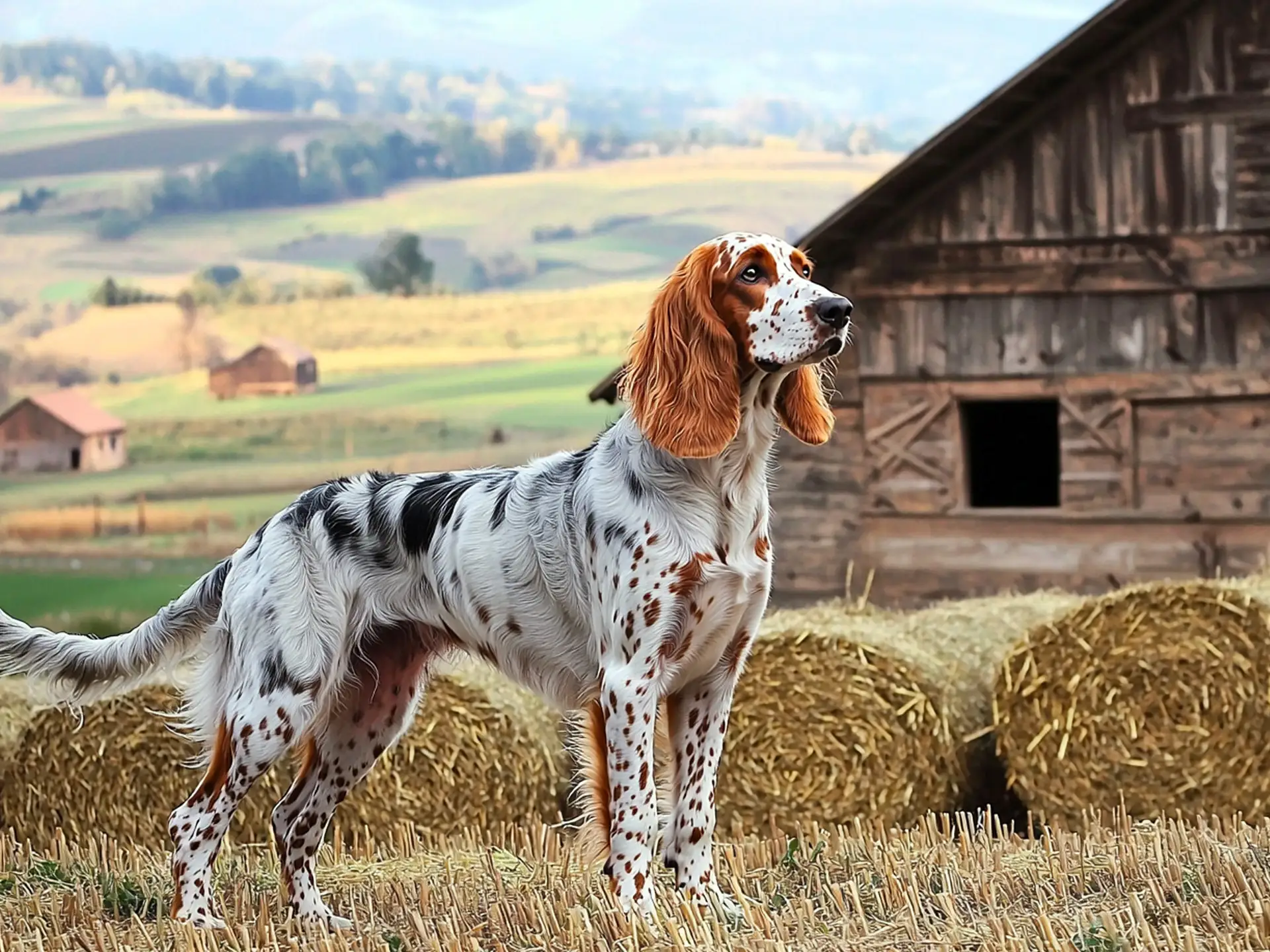English Setter Dog Breed Info & Overview
The English Setter, with its elegant build and athletic prowess, embodies both grace and strength. Originally bred for hunting game birds, this breed is admired for its unique speckled coat and warm, friendly nature. English Setters thrive in active households that can keep up with their energy and love for the outdoors, making them ideal companions for families who enjoy an active, nature-filled lifestyle.
Characteristics
Pictures
Breed History
The English Setter traces its roots back to the 14th century in England, where it was developed as a bird dog specialized in setting—or crouching—when it found game birds. This unique behavior allowed hunters to approach and cast nets over both the dog and the birds. The breed evolved over centuries, blending spaniels, pointers, and other setters to enhance its hunting prowess.
By the 19th century, breeders like Edward Laverack and R. Purcell Llewellin refined the English Setter into distinct lines. Laverack focused on developing the breed’s elegance and show qualities, while Llewellin emphasized field performance. These efforts led to the modern English Setter, celebrated for both its beauty in the show ring and its effectiveness in the field.
The breed’s popularity spread beyond England, reaching America in the late 1800s. The American Kennel Club recognized the English Setter in 1884, and it has since become a beloved breed among hunters and dog enthusiasts alike. Its rich history as a versatile gun dog contributes to its enduring appeal.
Temperament, Personality
English Setters are known for their gentle and friendly nature. They are affectionate dogs that thrive on human companionship, making them excellent family pets. Their sociable disposition means they generally get along well with children and other animals, especially when properly socialized from a young age.
These dogs have an energetic spirit balanced by a calm demeanor indoors. They are eager to please and respond well to positive reinforcement training methods. However, their sensitive nature means harsh training techniques can be counterproductive. Patience and consistency are key to bringing out the best in their personality.
While they are friendly with familiar faces, English Setters may be reserved around strangers initially. Early socialization can help them become more comfortable in new situations. Their alertness and keen senses, a legacy of their hunting background, also make them attentive companions who are always curious about their surroundings.
Physical Characteristics
The English Setter is a medium to large-sized dog, characterized by its athletic build and graceful movement. One of its most striking features is its long, silky coat adorned with flecks of color known as “belton.” Coat colors can include orange, lemon, liver, or black markings over a white background, giving the breed its distinctive appearance.
Their heads are long and lean with a well-defined stop, and they have dark brown eyes that convey a soft, intelligent expression. The ears are set low and hang close to the head, covered with silky hair. Their tails are medium-length and carried level with the back, adding to their elegant silhouette.
The English Setter’s body is well-proportioned with a deep chest and strong, muscular legs built for endurance. Their overall physique reflects their heritage as working dogs bred for stamina and agility in the field. This combination of beauty and functionality is part of what makes the breed so special.
Health Issues
Like many purebred dogs, English Setters are prone to certain health conditions. Hip dysplasia is a common concern, where the hip joint doesn’t develop properly, potentially leading to arthritis or mobility issues. Regular veterinary check-ups and screening can help detect and manage this condition early.
Another health issue to be aware of is deafness, which can be hereditary in this breed. Responsible breeders often test for hearing and avoid breeding dogs with known hearing problems. Additionally, English Setters may be susceptible to thyroid disorders and certain eye conditions like progressive retinal atrophy.
Maintaining a healthy lifestyle with proper diet and exercise can help mitigate some health risks. Regular grooming also provides an opportunity to check for skin issues or infections. Collaborating with a trusted veterinarian for routine care and preventive measures is crucial to ensure your English Setter stays in optimal health.
Grooming Needs
The English Setter’s beautiful coat requires regular grooming to keep it in top condition. Their long, silky fur is prone to tangling and matting, especially behind the ears and under the legs. Brushing at least two to three times a week is recommended to prevent knots and reduce shedding.
Bathing should be done as needed, typically every six to eight weeks, using a dog-friendly shampoo to maintain the coat’s luster. Pay special attention to drying thoroughly to avoid skin irritations. Regular trimming of the hair around the feet and ears can also help keep your dog comfortable and tidy.
Don’t forget about dental hygiene and nail care. Brushing your English Setter’s teeth several times a week can prevent dental diseases. Nails should be trimmed monthly if they don’t wear down naturally. Regular ear checks are important too, as their floppy ears can be prone to infections.
Exercise Requirements
English Setters are an active breed with high energy levels, originally bred for long days in the field. They require at least 1–2 hours of exercise daily to keep them physically and mentally stimulated. Activities can include brisk walks, jogging, hiking, or play sessions in a securely fenced area.
These dogs excel in canine sports such as agility, obedience, and field trials, which can be a great way to channel their energy and intelligence. Participating in such activities not only keeps them fit but also strengthens the bond between you and your dog.
Without sufficient exercise, English Setters may become bored and develop undesirable behaviors like excessive barking or digging. They are not well-suited for apartment living due to their need for space and activity. An active owner who enjoys the outdoors will find a perfect companion in this breed.
Training Tips
English Setters are intelligent and eager to please but can sometimes be stubborn or easily distracted, especially if they catch an interesting scent. Positive reinforcement methods using treats, praise, and play are most effective. Keep training sessions short and engaging to maintain their attention.
Early socialization and puppy training classes are highly recommended. Exposing them to a variety of people, places, and situations will help them grow into well-adjusted adults. Patience and consistency are key, as harsh corrections can damage their sensitive nature.
Incorporating games and activities that stimulate their natural hunting instincts can make training more enjoyable. Scent work or tracking exercises can be particularly rewarding for the English Setter. Remember, a well-trained dog is a happy dog, and training should be a fun experience for both of you.
Nutrition, Diet
Feeding your English Setter a balanced diet is essential to support their active lifestyle. High-quality dog food formulated for medium to large breeds with high energy levels is recommended. Look for foods rich in protein to maintain muscle mass and overall health.
Portion control is important to prevent obesity, which can exacerbate health issues like hip dysplasia. Typically, an adult English Setter will consume between 2.5 to 3 cups of dry food per day, divided into two meals. However, the exact amount can vary based on age, weight, and activity level.
Some English Setters may have food sensitivities or allergies, so monitoring for any adverse reactions when introducing new foods is advisable. Always ensure fresh water is available, and consider consulting your veterinarian to tailor a diet plan that meets your dog’s specific nutritional needs.
Adoption, Breeders
If you’re considering adding an English Setter to your family, adopting from a rescue organization or shelter is a wonderful option. Many purebred dogs are in need of loving homes. Organizations like the English Setter Rescue Association specialize in rehoming this breed.
If you choose to purchase from a breeder, it’s crucial to find a reputable one who prioritizes the health and temperament of their dogs. Ask for health clearances for both parents, and visit the breeding facility to observe the conditions and meet the puppies’ mother.
Avoid purchasing from pet stores or online ads without thorough research, as these sources may support puppy mills. Taking the time to find a responsible breeder or rescue organization ensures you bring home a healthy, well-adjusted English Setter.
Family Pet?
English Setters make excellent family pets for households that can meet their exercise and companionship needs. Their affectionate and gentle nature makes them great with children, often becoming devoted playmates. They thrive in environments where they are considered part of the family.
Their sociable personality generally extends to other pets as well. With proper introductions and socialization, they can get along with other dogs and even cats. However, their hunting instincts may lead them to chase smaller animals, so supervision is recommended.
English Setters are happiest in homes where someone is around for much of the day. They can experience separation anxiety if left alone for long periods. Families that enjoy outdoor activities will find this breed a joyful and enthusiastic participant.
Right For You?
Deciding if an English Setter is right for you depends on your lifestyle and expectations. If you’re an active individual or family who enjoys spending time outdoors and can commit to regular exercise and grooming, this breed could be a perfect match.
They are best suited for homes with a yard where they can run and play. Apartment living may not provide the space they need to thrive. Consider your ability to invest time in training and socialization to ensure a well-mannered companion.
Ultimately, if you’re looking for a loving, energetic dog that offers both companionship and an active lifestyle, the English Setter may be the breed for you. Their loyal and gentle disposition makes them a rewarding addition to the right home.
Conclusion
Graceful, affectionate, and full of energy, the English Setter is a breed that brings joy to those who can meet its needs. With the right balance of exercise, training, and love, they make devoted companions and wonderful family pets. If you’re ready for an active and loving canine friend, the English Setter might just be the perfect fit.
FAQs
-
What type of activities do English Setters enjoy most?
English Setters love activities that engage their natural hunting instincts, such as scent tracking, field trials, and retrieving games. Long hikes and interactive play sessions are ideal to keep them both mentally and physically satisfied.
-
Do English Setters have specific dietary needs?
English Setters benefit from a balanced diet tailored to active, medium-sized breeds. They may require higher protein levels, particularly if they are very active. Monitoring their weight and adjusting portions as needed helps maintain optimal health.
-
Are English Setters easy to train for novice dog owners?
English Setters are intelligent but may be slightly stubborn, requiring patience and consistency during training. While they are eager to please, they benefit from positive reinforcement techniques and can excel with a dedicated first-time owner willing to invest time in training.
-
What grooming challenges are unique to English Setters?
Their feathered coat requires frequent brushing to prevent mats, especially around their ears and legs. Regular grooming sessions also help manage shedding and keep their coat healthy. Many owners find that a professional groomer is helpful for maintenance.
-
Can English Setters adapt to family life with small children?
Yes, English Setters are gentle and patient, making them generally well-suited to family life with children. Supervision is advised with younger kids due to the breed’s energy, and early socialization ensures they’re comfortable around all family members.
Breed Ratings
English Setters are intelligent and can learn quickly, especially with positive reinforcement, but may be occasionally distracted.
This breed loves to play and has a joyful demeanor, making them great companions for families who enjoy interactive games.
High energy levels mean they need plenty of exercise. Ideal for owners who can provide daily physical activity and mental stimulation.
Moderate shedding occurs throughout the year. Regular brushing helps manage loose hair and keeps their coat looking its best.
Bred for hunting, they have a strong prey drive. May chase small animals, so secure fencing and supervision are important.
Their long, silky coat requires frequent grooming to prevent matting. Be prepared for regular brushing and occasional professional grooming.
Responsive to positive training methods, they can excel in obedience and field work but may need patience due to occasional stubbornness.
They prefer company and may experience separation anxiety if left alone too long. Best with families where someone is often home.
Not excessive barkers but may vocalize when excited or bored. Proper training can manage unnecessary barking.
Generally minimal droolers, but some individuals may drool slightly, especially when anticipating food or after exercise.
Known for their sociable nature with other dogs. Enjoy canine companionship and are often friendly in dog parks.
Prone to certain health issues like hip dysplasia and deafness. Regular vet care and responsible breeding practices are essential.



















